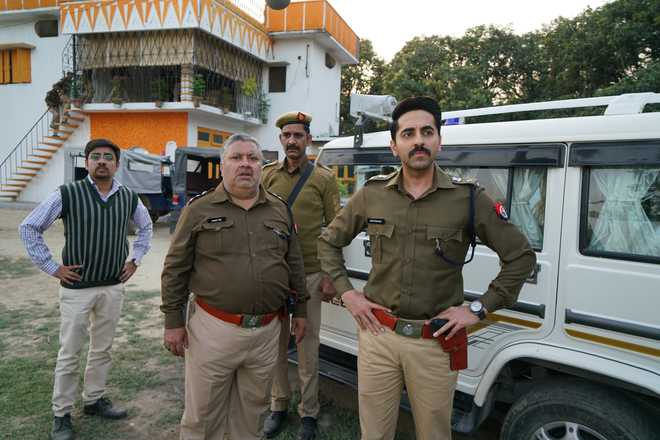Nonika Singh
Perhaps even the most well-read among us need a reminder what Article 15 is all about and how it is flouted in both subtle and loud ways all the time. However, in our hinterland, discrimination acquires a monstrous and horrific colour. Caste system and prejudices that emanate from varan vyavsatha’s vicious deep-curling roots is what forms the crux of the film.
It begins with a rather irrepressible song— Kahab to lag jaye dhak se, Bade bade logan ke bangla do bangla, Aur bhaiya AC alag se—driving home social inequalities that plague India.
Yes, the very India whose monumental wonders, as the protagonist of the film tells us, we sell to the rest of the world with great pride and ownership. But do we own or even see its fault-lines? Director Anubhav Sinha does exactly that. He holds a mirror to a world, which many of us among the urban-bred don’t even know exists in our country. It helps that someone like us, a sophisticated urbane police officer, shows us this dark reality. Through his eyes, the horror of caste bigotry gets manifold.
Ayushmann Khurrana, the actor now synonymous with meaningful cinema, pitches in an assured performance. As a young IPS officer, who arrives in this small district, he gets a cultural shock from the word go. Rape and consequent murder of two minor girls hit him and us the viewers. Till the first half, the film unfolds as a procedural thriller and is both compelling and meaningful.
Post intermission, director does get a trifle ambitious and opens many fronts. The politics of votes, revolutionary Dalit leaders, a religious guru and then CBI is depicted as political putty. Nevertheless, Sinha does weave it well with the main plot that stays as much with its hero as his mission to ‘unmess’ it all. Unmess—is that even a word, questions his activist girlfriend. But as expected in the film, the mess does get resolved and rather satisfactorily and poetic justice is delivered as it invariably is in most of our films.
However, it is not the end which matters, but what Sinha achieves in between. He raises a stench and you can actually smell the garbage, which he repeatedly reminds us is collected by these very Dalits. Sure, in free democratic India, they have options and he lets us in on that too. But his major mission is to force you to look deep and hard and not turn the other way, as we normally do at the sight of both the garbage and garbage pickers.
If you care to look, you will find a narrative that is engaging with some clever writing and one-liners at play. Though it states certain harsh facts, even spells out clearly what Article 15 stands for, yet it doesn’t really turn patronising. Despite the underlying objective, the tone isn’t sermonising. With naturally consummate actor Ayushmann primarily in the saddle, even bits where he goes in the heroic mode and confronts the CBI officer, things don’t seem superimposed or artificial. Characters look real and act so. Kumud Mishra and Manoj Pahwa are on the top of the game. Sayani Gupta as a Dalit woman in search of justice is suitably etched, though we can’t say the same for Mohammed Zeeshan Ayyub (special appearance). The only problem with the film is that you see their predicament as an outsider and don’t quite feel the anguish of the two fathers who have lost their daughters. Or, is their composure, too, a statement on how they have internalised their unenviable condition?
Either way, the film holds your attention all through. It may not be a tour de force, but pulsates with a beating heart. And like Sinha’s previous outing Mulk, baring religious prejudices, it is a significant addition to the roll of cinema with purpose. See it as an article of faith and why Article 15 merits a film (actually it deserves more than one) shall become more than obvious.
nonikasingh@tribunemail.com
Unlock Exclusive Insights with The Tribune Premium
Take your experience further with Premium access.
Thought-provoking Opinions, Expert Analysis, In-depth Insights and other Member Only Benefits
Already a Member? Sign In Now











